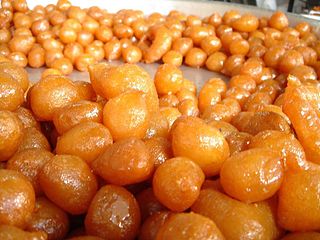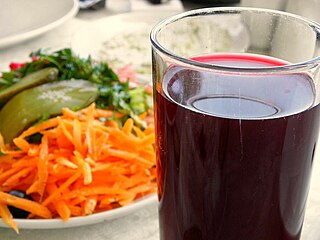Related Research Articles

Cameroon, officially the Republic of Cameroon, is a country in west-central Africa. It is bordered by Nigeria to the west and north; Chad to the northeast; the Central African Republic to the east; and Equatorial Guinea, Gabon and the Republic of the Congo to the south. Its coastline lies on the Bight of Biafra, part of the Gulf of Guinea and the Atlantic Ocean. The country is sometimes identified as West African and other times as Central African, due to its strategic position at the crossroads between West and Central Africa. Its nearly 25 million people speak 250 native languages.

Halloumi or haloumi is a semi-hard, unripened cheese made from a mixture of goat's and sheep's milk, and sometimes also cow's milk. Its texture is described as squeaky. It has a high melting point and so can easily be fried or grilled, a property that makes it a popular meat substitute. Rennet is used to curdle the milk in halloumi production, although no acid-producing bacteria are used in its preparation.

Central Africa is a subregion of the African continent comprising various countries according to different definitions. Angola, Burundi, Cameroon, the Central African Republic, Chad, the Democratic Republic of the Congo, the Republic of the Congo, Equatorial Guinea, Gabon, Rwanda, and São Tomé and Príncipe are members of the Economic Community of Central African States (ECCAS). Six of those states are also members of the Economic and Monetary Community of Central Africa (CEMAC) and share a common currency, the Central African CFA franc.

Horchata, or orxata, is a name given to various kinds of plant-based beverages. It is known in Valencia as orxata de xufa. In Spain it is made with soaked, ground, and sweetened tiger nuts. In Latin America, and other parts of the Americas, the base is jicaro, melon or sesame seeds, or white rice, along with other spices. In West African countries such as Nigeria and Mali, it is known as kunnu aya. Different varieties can be served hot or cold, and may be used as a flavor in other beverages, such as frappé coffee.

Fufu is a dough-like food found in West African cuisine. In addition to Ghana, it is also found in Sierra Leone, Guinea, Liberia, Cote D'Ivoire, Benin, Togo, Nigeria, Cameroon, the Democratic Republic of Congo, the Central African Republic, the Republic of Congo, Angola and Gabon. It is often made in the traditional Ghanaian, Ivorian, Liberian, and Cuban method of separately mixing and pounding equal portions of boiled cassava with green plantain or cocoyam, or by mixing cassava/plantains or cocoyam flour with water and stirring it on a stove. The viscosity is then adjusted based on personal preference and eaten with broth-like soups. Some countries, particularly Nigeria, have a version of fufu made from fermented Cassava dough that is eaten with thick textured stews. Other flours, such as semolina, maize flour, or mashed plantains may take the place of cassava flour. Fufu is eaten with the fingers, and a small ball of it can be dipped into an accompanying soup or sauce.

The muffuletta or muffaletta is both a type of round Sicilian sesame bread and a popular sandwich that originated among Italian immigrants in New Orleans, Louisiana, using the same bread.

The Kirdi are the many cultures and ethnic groups who inhabit northwestern Cameroon and northeastern Nigeria.

Cameroonian cuisine is one of the most varied in Africa due to Cameroon's location on the crossroads between the north, west, and center of the continent; the diversity in ethnicity with mixture ranging from Bantus, Semi-bantus and Shuwa Arabs, as well as the influence of German, French and English colonialization.

Israeli salad is a chopped salad of finely diced tomato, onion, cucumber, and bell or chili peppers. It has been described as the "most well-known national dish of Israel", and is a standard accompaniment to most Israeli meals. Salads following essentially the same recipe, with different names, are widespread and popular throughout the Eastern Mediterranean.

Khubz mulawah, mulawah, or rashush is a Yemeni flatbread that is baked in a traditional tannur in Yemeni cuisine. A similar bread, malawach, has been brought to Israel by Yemenite Jews.

Chocolat is a 1988 film directed by Claire Denis, about a French family that lives in colonial Cameroon. Marc and Aimée Dalens are the parents of France, a young girl who befriends Protée, a Cameroon native who is the family's household servant. The film was entered into the 1988 Cannes Film Festival.

Rail transport in Cameroon is primarily operated by Camrail, a subsidiary of Bolloré Africa Logistics.

Lokma are pastries made of leavened and deep fried dough balls, soaked in syrup or honey, sometimes coated with cinnamon or other ingredients. The dish was described as early as the 13th century by al-Baghdadi as luqmat al-qādi, "judge's morsels."

A famine food or poverty food is any inexpensive or readily available food used to nourish people in times of hunger and starvation, whether caused by extreme poverty, such as during economic depression or war, or by natural disasters such as drought.

Qurabiya is a shortbread-type biscuit, usually made with ground almonds. Versions are found in most countries of the Arab world, with various different forms and recipes.

Palm nut soup is a soup made from palm fruit and it is common in the African community. It originated from the Urhobo tribe in Delta State, Nigeria. Palm nut soup has become a continental soup.

Şalgam or Şalgam Suyu, pronounced "shal-gam", is a popular traditional beverage from the southern Turkish cities of Adana, Hatay, Tarsus, Mersin, Kahramanmaras, İzmir and the Çukurova region. The name şalgam is Persian in origin; in Persian it is written شلغم and means Turnip. It is either called turnip juice, turnip water, shalgam juice, or shalgam water. The French traveler, naturalist and writer Pierre Belon described its production method in the 15th century. Şalgam is produced by lactic acid fermentation. Studies have shown that the juice of the purple carrot used in Şalgam reduces the effects of high-carbohydrate, high-fat diets in rats. It is one of the most popular beverages during winter in Turkey.
References
- ↑ "Get Out The Fufu: 10 Foods From Cameroon You're Gonna Love". March 9, 2016.
- ↑ Labadens, Ndeye (July 13, 2018). "African Memories: Travels". Lannconsultings.com – via Google Books.
- ↑ "Sangah | Traditional Vegetable Dish From Cameroon | TasteAtlas". www.tasteatlas.com.
- ↑ Ekane, Metuge (September 23, 2019). Garrulous Ego Trip Gang: Tale of woe in African intellectualism. BoD - Books on Demand. ISBN 9789178514137 – via Google Books.
- ↑ "English in Cameroon" (PDF). www.uni-due.de. 2010. Retrieved 2020-06-01.